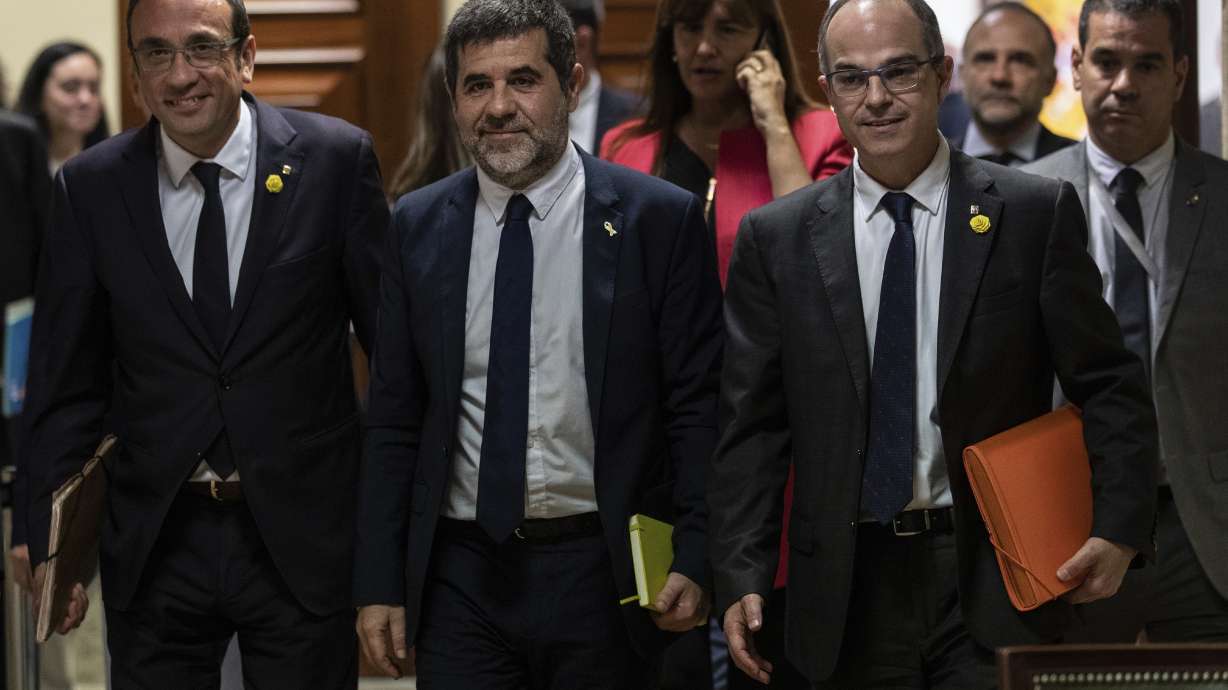Estimated read time: 2-3 minutes
This archived news story is available only for your personal, non-commercial use. Information in the story may be outdated or superseded by additional information. Reading or replaying the story in its archived form does not constitute a republication of the story.
MADRID (AP) — A fragmented Spanish Parliament convened Tuesday after last month's inconclusive general election, including for the first time Catalan politicians released from pre-trial detention for the occasion, as well as two dozen lawmakers from an upstart far-right party.
Socialist leader Pedro Sánchez won the national election but fell short of enough seats to form a government on his own. He has put off negotiations on governing alliances until after the European ballot concludes on Sunday, which in Spain coincides with votes to elect local councils and a dozen regional governments.
Escorted by police, four separatists on trial for Catalonia's 2017 secession attempt, including former Catalan regional Vice President Oriol Junqueras, appeared in the Congress of Deputies, while former Catalan regional minister for international relations Raül Romeva was ferried to the Senate from a jail some 40 kilometers outside of Madrid.
The Supreme Court has allowed them to attend the opening sessions in Madrid but they are likely to be barred from future meetings by the chambers' governing bodies, due to be elected later on Tuesday.
Dressed in suits and exchanging embraces and greetings with other lawmakers, Junqueras and the three others took seats in the Congress of Deputies among political opponents, including two far-right Vox party deputies who are also prosecutors in their ongoing trial for rebellion and other charges that could land them in prison for decades.
Vox is the first parliamentary party that openly espouses Spanish nationalism since dictator Gen. Francisco Franco died in 1975. It wants to use its 24 seats among the 350 lower house lawmakers to propose legal reforms on abortion, violence against women and migration.
The eruption of Vox in the late April election split the right-wing vote into three groups, which together fell short of the 176 majority. As a result, competition for the leadership of the opposition has intensified between two parties — the once-dominant conservative Popular Party and the center-right Citizens.
The Socialists were the leading party in the election with 123 seats. But with Citizens ruling out any pacts to support a Socialist administration, Sánchez's efforts to form a government are centered on the anti-austerity Unidas Podemos, which holds 42 seats, and some other smaller groups.
Tuesday's unconventional session provided a number of odd situations to satisfy media camera lenses. Vox's deputies chose to take seats that in past sessions had been occupied by the Socialists, placing the far-right party's leader, Santiago Abascal, right behind Sánchez and other members of the Socialists' caretaker government.
Sánchez greeted Abascal with a handshake. The Socialist leader also shook hands with Junqueras, who has become a symbol for pro-independence supporters in the northeastern Catalonia region.
Spain's new lower house also has the highest number of female lawmakers —166 out of 350— since Spain returned to democracy in the late 1970s.
__
AP photographer Bernat Armangue contributed to this report.
Copyright © The Associated Press. All rights reserved. This material may not be published, broadcast, rewritten or redistributed.








